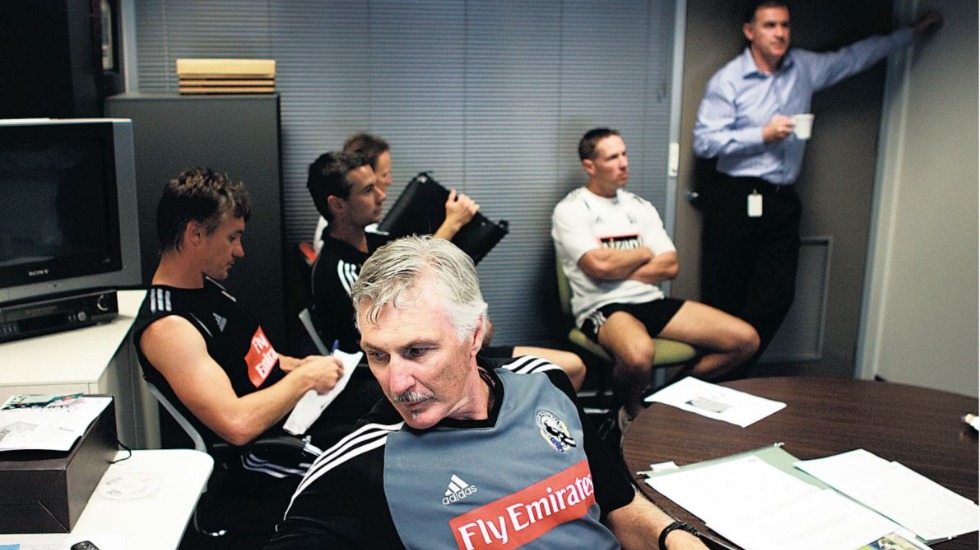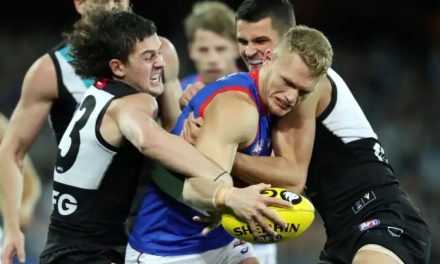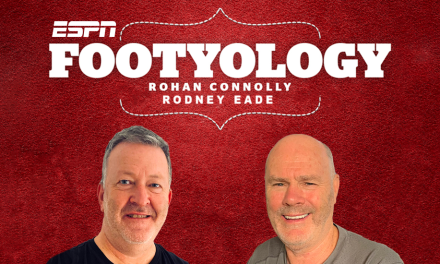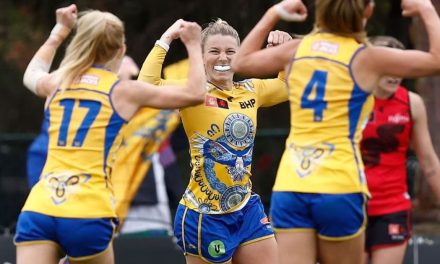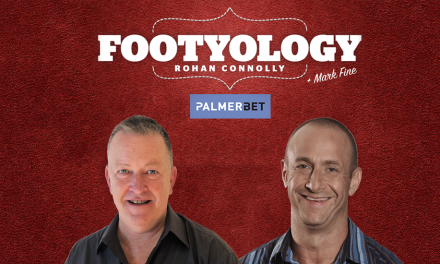2007: Collingwood’s “war room”. Malthouse and (from left): Fletcher, Caracella, Gotch, Brown, Walsh. Photo: JOHN DONEGAN
FIRST PUBLISHED IN “THE AGE” IN 2007
It hasn’t been the greatest of lead-ins to a new season of our greatest game. Drugs and betting scandals, a litany of off-field incidents and court appearances have all soured the image not only of some of the biggest stars, but a whole code.
But there’s been a different, expectant feel around town this week. The point of it all — fair-dinkum matches of AFL football — is finally here again. And after months of careful preparation, in some cases stretching back to early last October, plans are about to be put to the test. Crunch time has arrived.
It is nowhere more the case than at Collingwood, Melbourne’s biggest, richest and most famous club, but already a popular tip to slide from the eight this season after its inglorious exit in the first week of last year’s finals.
The Magpies, of course, have other ideas, and this week, The Age had a rare insight into how they plan to prove the rest of the football world wrong.
The Age’s request to spend the final five days of Collingwood’s season countdown deep inside the club was granted by coach Mick Malthouse, with only one condition. That we were there for everything — the training sessions, the backroom work, the team meetings, and even that most sacred of inner sanctums, the match committee room.
At a time when AFL clubs might be more suspicious of the media than ever, it was open slather. It proved a fascinating and illuminating exercise, the sort of resources and work that go into just one game of football remarkable, the level of detail mind-boggling.
It all gets put on the line at 2pm today at the MCG when Collingwood runs out o take on the Kangaroos. And here, with the exception of a few names omitted to, as they say, protect the innocent, is how the Magpies went about getting ready for that very moment.
MONDAY
It’s morning, five days out from the first bounce, and already Collingwood’s Lexus Centre home is buzzing with anticipation. The senior list is getting ready to train, and in the football department, an army of coaches and support staff are checking notes.
But there’s a sense of urgency in the administrative offices, as well. They, too, have to adapt quickly to rapidly changing circumstances, and particularly so this week after the shock departure the previous Friday of chief executive Greg Swann, for, of all places, hated rival Carlton.
Chief operating officer Eugene Arocca has stepped into the breach, and is busy getting his head around the extra workload. Today, he also has to appear in the Melbourne Magistrate’s Court to give character evidence for Magpie Brodie Holland, who is charged with recklessly causing injury to a woman in an incident last year.
Collingwood won’t miss a beat on the field because of Swann’s hasty exit, the club insists. But it’s a distraction emerging tar Dale Thomas, for one, didn’t need. He was living with Swann and his family, and now has to find new lodgings, pronto. At 9.30am, the players head down the stairs to the Lexus Centre’s spacious theatrette, situated underneath the 25-metre swimming pool, for a pre-training team meeting.
There’s no rousing speeches needed this morning. It’s a video instead that does the job, a 25-minute feature technology manager Russell “Rusty” Butler, one of half-a-dozen full-time information and technology employees, has been working on until 4am.
With accompanying music by the likes of Foo Fighters and Green Day, the montage of stills takes in Collingwood’s Arizona training camp last November, and the several months of gut-busting trackwork that has followed. Some cheesy shots and blatant piss-taking of selected senior players earn some big laughs from the group.
It’s good, atmospheric stuff, shots of the players at the 3860-metre summit of Mount Humphreys, arms raised triumphantly after the gruelling nine-hour trek, and inspiring quotes from the players setting the mood. The presentation finishes with the message: “Season 2007 — It’s here.”
And about time, you can almost hear the group mutter as one. The 90-minute training session that follows at Gosch’s Paddock down the road is far from seamless, but there’s an extra edge about the work with the point of it all now so close. Football manager Geoff Walsh notices it. “I reckon you can see the lift in tempo,” he says.
Assistant coaches Guy McKenna, Gavin Brown, Blake Caracella and Adrian Fletcher are back at their desks and computers soon afterwards, sophisticated software helping them sift through video footage of set plays and particular game situations, and reams of statistics concerning their side and Saturday’s opponent.
The countdown is on.
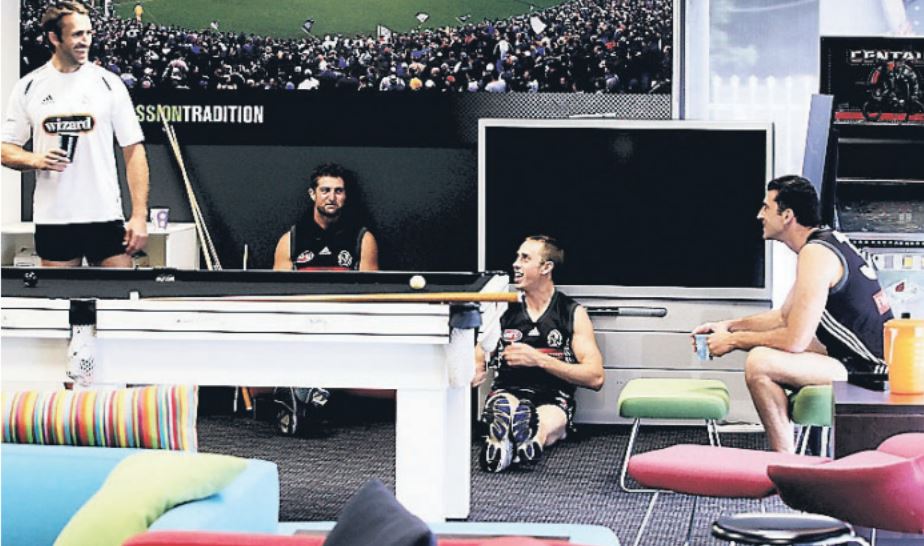
Down time for (from left) Shane Wakelin, Shane O’Bree, Nick Maxwell and Simon Prestigiacomo. Photo: JOHN DONEGAN
TUESDAY
Yesterday it was the players having a good, solid workout in the lead-up to the big first game. Today it’s the coaches’ turn. The match committee meets at 9.30am in what is a fairly functional office with a long table, enough seats for a dozen, a whiteboard at one end and large projection screen at the other. On these occasions, however, it’s fondly referred to as the “War Room”.
Present are senior coach Mick Malthouse, football manager Geoff Walsh, head conditioning coach David Buttifant, opposition analyst John Wardrop, Williamstown (the Pies’ VFL team) coach Brad Gotch and Malthouse’s crew of senior assistants, Brown (defensive coach), Fletcher (stoppages) and Blake Caracella (offence).
Buttifant kicks proceedings off with a rundown on the fitness or otherwise of the entire list, who’s ready to go, who’s some sort of chance, and for those already discounted, such as skipper Nathan Buckley (hamstring) and youngsters John Anthony (neck) and Chris Dawes (knee), an update on how they’re progressing and a likely return date.
Then it’s McKenna’s turn. Malthouse’s prize defender in two West Coast premierships in the 1990s, and a trusted lieutenant, steps up to the screen with a possible Kangaroos line-up he and Wardrop have plotted and begins a thorough briefing on the Roos’ style of game, its key architects and how it and they might be brought undone. The input of Wardrop, another long-time Malthouse offsider, is critical.
He’s been watching not only the Roos’ training and games for the past month, but those of Collingwood’s next two opponents, West Coast and Richmond. Football manager Walsh is a particularly handy source of information, too, having left the Roos for the Magpies at the end of last season after 11 years at Arden Street.
The examples spoken about come not only from Collingwood’s first-round NAB Cup loss to the Roos at Carrara a month back, but its opponent’s second-round clash with Fremantle, its semi-final loss to Carlton and a practice game against St Kilda.
The Roos’ modus operandi, set plays, favourite tactical ploys, “go-to” players and potential surprises are all discussed at length, some original positions of Kangaroo players switched and contingency plans thrown up. There’s a spirited debate about just where one key Roo will line-up and what it means should he do so. Then the attention switches to “us” rather than “them”.
Fletcher starts placing the Collingwood midfielders next to the Roos’ equivalents, explaining the rationale behind each pairing. Caracella does similarly with the forwards and Brown the defenders.
Malthouse interrupts Caracella briefly to tell him to put the Collingwood names above those of the Roos rather than below. Why? “That’s just straight-out superstition,” the senior coach laughed.
A relatively passive observer to this point, Malthouse suddenly puts a little heat on his support crew.
“What do we do if (Roos player) moves there (pointing)?” he asked urgently. “Quickly, come on. What if (a Roos player) goes to a half-back flank and (another Roos player) goes on-ball? Quickly, respond to it.”
Brown offers a series of positional switches to effect a particular result. “Why take the lid off the pressure cooker (by doing so)?” said the coach. “I’m just playing devil’s advocate, boys.”
He’s coaching the coaches and recreating the sort of environment in which game-day plans will be overseen, he explains later. Brown, like his cohorts, takes it in his stride.
“You know he’s going to do it, so you’ve just got to be on your toes,” he said after the meeting. “You can’t walk in there unprepared; you’ve got to have thought a bit about and be able to pre-empt anything that might be thrown up.
“As much as you might have an idea about a side or particular opponent, someone will always see something else or bring something else up that you mightn’t have thought of.”
There’s not much, though, that hasn’t crossed Malthouse’s mind about this week. He steps up to the board and delivers a thorough overview of the proposed match-ups, forward, defensive and on-ball structures, possible alternatives, strategies at both the Pies’ and opposition kick-ins and which Magpies are most likely to put the required heat on particular Kangaroo key players.
The first senior side of the new season is pretty close to already picked, only one or two spots left to be decided, the candidates for them now the subject of intense discussion.
After two hours of intricate planning and debate, the “war game” wraps up, but McKenna, Fletcher, Brown and Caracella remain around the screen to work on the drills to be executed at tomorrow’s main training session of the week.
The set plays get particular attention, with specific Pie players designated to fill the roles of certain Kangaroo opponents. Even in simulation, nothing is to be left to chance.
There’s one shock left in store today. Malthouse invites this observer for a quick bite for lunch. “How much did you have to fork out?” joked the assistants later. “Didn’t. His shout.” There’s a loud thud, followed by a couple of bodies picking themselves off the floor.
WEDNESDAY
The players spent the previous morning at Olympic Park getting massage followed by “rehab” sessions on the bike in the gym or swimming. There was a bit of kick-to-kick on the sprung wooden floor indoors.
The pace and the atmosphere amps up a notch again this morning with the critical training session of the week to be held at Gosch’s Paddock at 11am. But there’s an important team meeting first at 9.30, McKenna to address the troops in the theatrette about Saturday’s opponent.
First, however, it’s what “Bluey” calls bingo, a series of guernsey numbers called out, those who are not called leave the room and get ready for training. The 30-odd who remain know now they’re already “in” the team for Saturday, or at least some sort of chance.
The exception, of course, is injured skipper Buckley, who delivers an off-the-cuff reminder to his teammates about a couple of key areas that need to be addressed on Saturday, underlined by a player-driven initiative that defender Nick Maxwell, another member of the leadership group, spells out.
McKenna delivers a condensed version of what came up in match committee, projected on the big screen in point form, along with the question: “How hard are we prepared to work when we DON’T have the ball?”
Players often occupy the same seats in these meetings, and like the old school days, there’s sometimes a tendency of “wags to the back”. McKenna keeps potential “drifters” on their toes by firing off questions about Kangaroo players. There’s a reminder to “make sure you do your homework”.
The players head up the stairs and on to the sprung floor to walk through the drills about to be practised outdoors. Then it’s back to the theatrette for another quick meeting at 10.30. Malthouse quickly runs through which players will play which positions and the set-play structures before the full complement heads outdoors to put the theory into practice.
It’s not quite as long a session as Monday, but there’s more attention to detail, and a lot more animation in the senior coach’s voice as he barks instructions and lets his charges know all about it when they do something right or wrong.
Alan Didak, still trying to prove his fitness after major knee surgery, should be heading off for weights and hydro therapy. But something drags him away. Something far more important than a footy game.
PLEASE HELP US CONTINUE TO THRIVE BY BECOMING AN OFFICIAL FOOTYOLOGY PATRON. JUST CLICK THIS LINK.
Media manager Nicki Malady takes Didak from the track early to tell him the sick youngster he was supposed to be visiting soon has deteriorated. The outlook is grim and today looks like being the last he will spend at his primary school in Glen Waverley.
Is it at all possible he could pay a quick visit now? Didak arranges to do the work he’ll miss the following morning, and he and Malady quickly head off.
There’s no need to ask how things went when they return later on. Both are emotional, Malady’s eyes brimming with tears.
The players head back to the lounge to tuck into some pasta, rolls and salads prepared by the evergreen Annie Martin, one of an army of diehard Magpie support staff on hand to attend to all manner of player and club needs.
The match committee assembles again at 1pm, this time in Malthouse’s office. It will be a short meeting, he said. “If we haven’t covered everything by now …” He doesn’t need to complete the sentence.
It’s settling the last couple of spots in the team that’s the main issue now, and the merits of the competitors for them, including rookie-listed Danny Nicholls, are again tossed around the group. Walsh arranges to contact the AFL and have Nicholls promoted to the senior list.
“What sort of bench do we need?” asked Malthouse, and various combinations of talls, mediums, forwards and backs are discussed.
With the skies clouding over and rain in the air, Saturday’s weather becomes an issue as well, the senior coach quickly jumping on the internet to check the forward forecast, although a little sceptical about its merit.
“They can’t get one day right — how are they going to get three?”
THURSDAY
Only two days to go now, one training session to be completed and the sense of expectation continues to heighten. The first few butterflies in stomachs begin to flutter.
Around the football department, however, things are considerably quieter. Malthouse and his assistants will work from home today.
There’s little organised football activity at Olympic Park today, either. But there’s a steady stream of “customers”, 18 players in total, booked in for 45-minute massages from 7.30am onwards.
But the players aren’t the only ones getting pumped. Club president Eddie McGuire arrives about 2pm to meet department heads and to give a team talk of sorts to 40-odd administrative staff, reassuring them that chief executive Swann’s departure won’t upset the apple cart.
“I just reiterated how much confidence I had in them, and I issued the challenge to department heads to get fresh eyes, to go away and write a report for me based on what they’d do if they owned that department or if they had an unlimited budget and to really start again,” McGuire said.
Sydney-based high-powered business executive or not, Eddie’s still also the same fan who stood in the far less palatial surrounds of Victoria Park not all that many years ago. And like the Magpie army, he’s getting that “can’t wait for the footy to start” feeling.
“Oh yeah, it’s good to be back in town,” he said. “There’s two little boys in Sydney who have had their Collingwood jumpers folded at end of their bed for a week … and the other two are my sons! It’s good just thinking again about the footy. The excitement never leaves. For all the hoo-ha, I’m still just a Collingwood supporter.”
The behind-the-scenes stuff, meanwhile, never stops — for the likes of development manager Alan Richardson and new development coach and retired Brisbane premiership player Brad Scott in particular.
Scott assists with a duty-of-care and academy program, the first a sort of go-between program for players and the coaching staff, the second specific to first-, second- and third-year players.
The pair will speak to every player individually, perhaps referring them to club psychologist Simon Lloyd if required. A subsequent meeting with the coaching panel makes sure, says Richardson. It is “an opportunity to express, either with video or just verbally, what technical work we’re doing with them”.
While Malthouse and co, meanwhile, can’t be heard around the corridors today, it’s anything but a day off, more a chance, says the man about to coach his 540th game of league football in his 24th season in the role, to freshen up mentally for the couple of days’ intensity still ahead this week, not to mention see partners and children who otherwise might feel like widows or orphans these next few football-saturated months.
Physically, the coaching panel, all still relatively young men, and their 53-year-old boss, don’t need any freshening up at all. Most days, before finishing up, they’ll share a spirited workout of their own, barely raising a sweat on the speedball, rowing machine, boxing ring or in the simulated altitude training room.
It’s there where this observer nearly met his maker, and this report nearly ended, the previous evening, participation in one of these group sessions the payment for our unfettered access.
Somehow, we stumble through, and have some consolation in providing comic relief for the players peering through the office windows and wetting themselves at one of the most inept ever attempts to master the speedball. “Don’t worry,” mocked Rhyce Shaw as some headgear is produced for yours truly. “It’s not going to hit you back!”
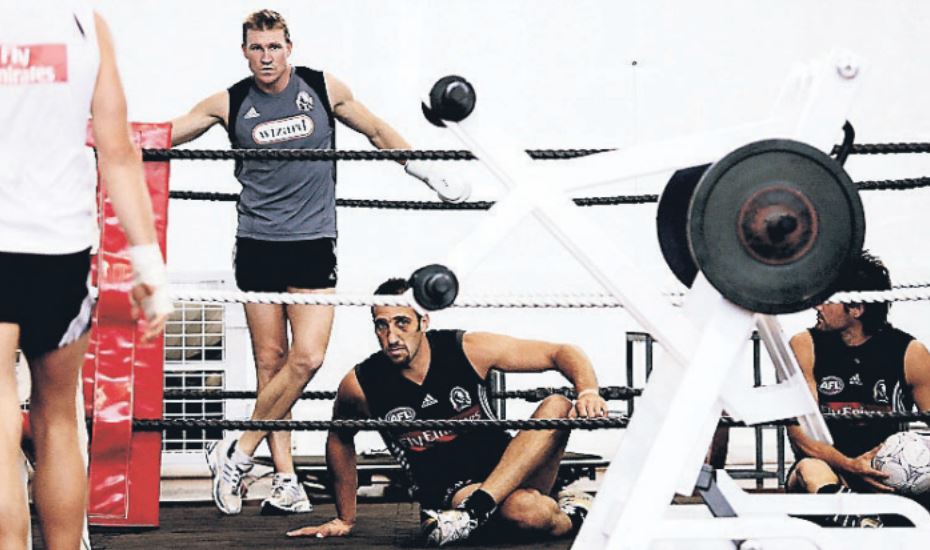
Captain Nathan Buckley and Anthony Rocca in the boxing ring. Photo: JOHN DONEGAN
FRIDAY
It’s early morning, the first bounce of the season just over 24 hours away, and you can feel the tension rising as the senior team heads down the steps to the theatrette for the final team meeting.
Eddie’s in the building again, the president visibly pumped and having a quick, encouraging word with most of the group.
“It’s such a huge part of our lives,” he said. “It’s almost like daylight saving ends, the early nights come in, and you remember: ‘That’s right. This is what sustains us through winter.’ ”
The players take their lecture seats and Malthouse takes the floor. “I know this is old hat for some,” he said. But it’s not for others. Like Fremantle recruit Paul Medhurst, who the coach points out will play his first game for the club. The group applauds.
He singles out Nicholls, and how close he’s come to making his debut, then repeats an oft-heard but much-repeated phrase: “Don’t count the games, make the games count.”
There’s a rundown on a couple of Kangaroo debutants and points their opponents should note, then more video. Not just the set-play and loose-ball situations that are run over again, but some of the Pies’ best work from that pre-season game against the Roos, strong tackles, the forward set-ups the coaching panel is looking for, and, as the coach puts it, “spatial awareness”.
After 40 minutes, it’s time to run through some stoppage situations indoors before the final training session. There’s one last bit of advice from the coach. “Football’s got to mean something to you, and if it means something to you, we’ll win this game.”
There’s still time for some fun, though. Opposition analyst Wardrop has been copping it for more than a year now, thanks to some constantly replayed TV footage of the Collingwood box during a loss late in 2005, in which Malthouse, in sheer frustration, flung a water bottle over his shoulder.
The projectile whacks Wardrop straight on the scone, an image that still draws howls of delight from staff and players. But there’s admiration, too. Wardrop doesn’t even flinch.
Today, it’s property steward Wayne “Disco” Connor’s turn to cop it, thanks to a story in the paper outlining his job. Team manager Jarrad Carey already has sent an email to everyone drawing their attention to the article, and in particular, what he feels is a rather generous assessment of the hours Disco puts in. “Check out the hardest-working man in Australia,” he scoffed.
The players head off to Gosch’s again for one final, short session before the big day. Injured quartet Buckley, Holland, Anthony and Darren Stanley do handball exercises, Chris Egan runs laps, the rest engaging in some quick ball movement and touch exercises, breaking into their special positional groups for a couple of final drills.
That’s it. Malthouse heads off for a midday news conference, but for the players, only the game remains, the group left to head off for lunch or home.
It’s a little harder this week, though, veteran Scott Burns acknowledging the element of uncertainty about the team and the individual after so long a break, but also the sense of anticipation.
“You’ve done all the hard work, you know you’ve done a whole pre-season, you’ve got some match fitness, and you’re just really keen to get out there, and pretty excited, even if you are a bit older,” he said.
Round one should take care of itself. Now the trick will be to keep the buzz going.
“You’ve just got to have faith in your fitness staff and your own body and that all that work carries on through,” Burns said. “You’ve got to maintain that for 22 weeks. That’s why this is such a hard sport.”
After a week inside Collingwood, an exercise fascinating, inspiring, highly educational, but one that has also offered a window on the all-absorbing and draining work that goes into preparing an AFL club for battle, we at least have a better idea of what he’s talking about.
TOMORROW: We spend the first game of Collingwood’s 2007 campaign inside the coaches’ box.

